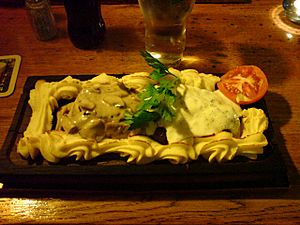Fatányéros facts for kids
Have you ever heard of a "mixed grill"? In Hungary, there's a special one called Fatányéros (say: Fah-tah-NYAY-rosh). It's a traditional Hungarian dish with different kinds of grilled meats. Think of it like a delicious barbecue platter! This tasty meal comes from a region called Transylvania.
Contents
What is Fatányéros?
The name Fatányéros means "on a wooden platter." That's because this dish is traditionally served on a special wooden board. Imagine a big plate with lots of yummy grilled meats arranged on it!
A Taste of History
This famous dish was first served around 1900 at a well-known restaurant in Budapest called Wampetich (which later became Gundel). It was offered as "fatányéros—Hungarian mixed grill on wooden platter."
What's on the Platter?
When you ordered Fatányéros at the restaurant, it came with several kinds of grilled meats. These included slices of veal, beef, and pork cutlets. It also had a piece of goose liver and a slice of bacon. All these meats were either grilled or roasted on a spit.
For side dishes, you would usually get french fries or thick slices of fried potatoes. A fresh mixed green salad was also served. Sometimes, a big knife with Hungarian designs was stuck right into the middle of the steak, making it look very impressive!
Pecsenye: A Hungarian Steak
The word pecsenye (say: PECH-en-yeh) is important in traditional Hungarian cuisine. It refers to any kind of meat that has been pan-fried. This can include pork, beef, chicken, or even game meats like venison.
Different Kinds of Pecsenye
There are many types of Hungarian pecsenye dishes. For example, Cigánypecsenye is another popular one, sometimes called "Gypsy roast."
Many of these pecsenye dishes are served on a wooden platter, just like Fatányéros. They are often arranged in a very artistic and decorative way. They come with tasty garnishes, fried vegetables, and a fresh salad. Some other examples include Bakonyi pecsenye, Tordai pecsenye, or Erdélyi fatányéros.
The Swedish Connection
This Hungarian dish is also very popular in Sweden. There, it's known as plankstek, which simply means "plank-steak." It was super popular in Sweden during the 1970s.
In Sweden, plankstek is usually served with creamy duchess potatoes. These are mashed potatoes that are piped into fancy shapes and then baked until golden. Vegetables and a creamy Béarnaise sauce are also common additions.
Where Did Plankstek Come From?
A Swedish book called Maträtternas historia (which means "The History of Dishes") has a different idea about where plankstek came from. This book won an award for being the best culinary history book in 2020!
The book suggests that Native Americans used to cook fish and sometimes meat on a cherry wood plank over an open fire. This cooking method might have inspired the dish. The first time a similar dish appears in a cookbook is in Charles Ranhofer's book, The Epicurean, from 1893 in New York.


